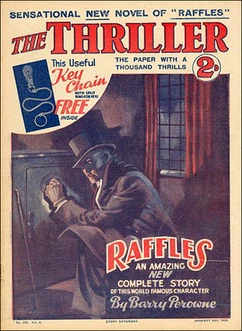
A.J. Raffles (it is occasionally noted that his first initial stands for 'Arthur') was a gentleman-amateur cricketer, of international standard, during the late nineteenth century. He was not, alas, able to afford to maintain the lifestyle expected of him, and therefore took to the life of a gentleman-thief, with the less-than-able assistance of an old schoolfellow, Harry "Bunny" Manders. The adventures of the pair, which culminated with Raffles's death in the Boer War, are described in books by E.W. Hornung, the brother-in-law of Arthur Conan Doyle.
The series was revived three times by Barry Perowne; firstly in the 1930s and in the early 1940s, in which Raffles and Bunny were transferred to a contemporary setting; then in the 1950s in a series of stories set at the turn of the century; then in the 1970s and 1980s as a celebrity-laden continuation of the stories from the 1950s. In a parody entitled "Ruffles versus Ruffles", the writer Jon L. Breen suggests that Perowne's fin-de-siecle Raffles, who is portrayed as rather more good-natured that Hornung's model, was actually the brother of the man whom Hornung wrote about.
There have also been a number of pastiches by various hands, notably "The Problem of Sore Bridge - Among Others" by Philip José Farmer, which features Raffles and Bunny embroiled in a Sherlock Holmes adventure with science-fiction overtones. Farmer makes mention of Raffles as a Wold Newton Family member in Tarzan Alive, where he is described as the son of Egidnia Rutherford, granddaughter of Sir Percy Blakeney and Alice Clarke Raffles who were present at the Wold Newton Meteorite strike. Alice Clarke Raffles is also said to be Raffles's great-aunt, presumably on his father's side. In his introduction to Arthur Upfield's standalone novel The House of Cain, Farmer also suggests that Raffles was Bony's father.